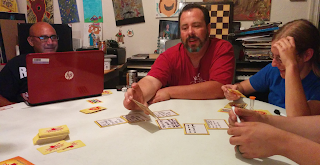Many of the world's creative celebrities have spoken or written about occasions in which they get asked the question, 'Where do you get your ideas?'
Alan Moore (who, just on the off chance that you don't know, is the author of many of the world's greatest comics, including
V for Vendetta and
Watchmen), said, 'We imply that even to have voiced such a question places [a person] irretrievably in the same intellectual category as the common pencil-sharpener. ... I know it isn't nice. ...it's something that we have to do. The reason why we have to do it is pretty straightforward. Firstly, in the dismal and confused sludge of opinion and half-truth that make up all artistic theory and criticism, it is the only question worth asking. Secondly, we don’t know the answer and we’re scared that somebody will find out.'
Gary Larson, creator of
The Far Side, says, 'I've always found the question interesting, because it seems to embody a belief that there exists some secret, tangible place of origin for cartoon ideas. Every time I hear it, I'm struck by this mental image where I see myself rummaging through my grandparents' attic and coming across some old, musty trunk. Inside, I find this equally old and elegant-looking book... embossed on the front cover in large, gold script is the title,
Five Thousand and One Weird Cartoon Ideas. I’m afraid the real answer is much more mundane: I don't know where my ideas come from.








